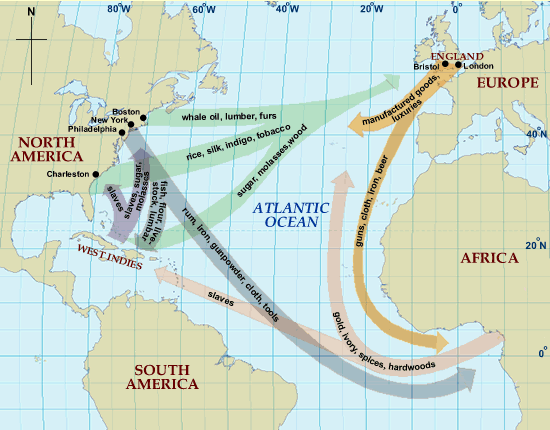Step 4: Explore the Business of Atlantic Trade
The trans-Atlantic slave trade and the demand for indentured servants sustained the financial interests of six major European empires by the mid-eighteenth century: Spain, Portugal, France, Britain, Denmark, and the Netherlands. Each empire competed to acquire enough valuable goods to strengthen its treasury, and geographic expansion helped imperial soldiers gain access to more valuable resources. International competition hinged on the concept of "mercantilism," the theory that only a certain amount of wealth existed in the world; the discovery of mines and fertile land in other countries helped ensure that one empire could grow more powerful than another. Read this short article from the Trans-Atlantic Slave Trade Database to see how the trade in plantation-grown cash crops influenced the African slave trade and the empires that maintained it.
As mentioned in the article, the economic and political interests of the major European empires shifted dramatically by the 1750s. In particular, British officials tried to regulate the trade between North America, the West Indies, West Africa, and England to produce maximum profit for 'the mother country.' American colonial leaders also got more involved in the trade process as the settlements expanded.
When Henry Spelman arrived in 1609, the Virginia colony was at constant risk of disappearing due to famine, disease, and conflict with the Powhatan Indians. The colony stabilized in the 1620s thanks to the development of tobacco plantations and the influx of laborers who made the plantations flourish. After Bacon's Rebellion in 1676, the Virginia plantation owners invested more of their profits into purchasing African slaves rather than hiring more indentured servants. The price of enslaved labor remained higher than the price of an indentured servant, which was one reason why most American colonial traders tried to cut expenses by purchasing supplies and manufactured goods at the cheapest rates. This trend was problematic for Britain because its mercantile system depended on a triangular trade pattern that sold slaves from West Africa, cash crops and lumber from North America, and manufactured goods from English factories.

The British government established a Board of Trade in 1696 to regulate these trade patterns with laws that required American colonists stop purchasing manufactured goods and luxuries from any traders who were outside of England. Nevertheless, a representative from the Virginia colony reported three years later that many of his fellow colonists continued the illegal luxury trade with pirates and non-English traders. Consider how his words linked illegal trade and slavery with England's diminishing political control in America.
-- William Byrd II, "Representation of Mr. Byrd concerning Proprietary Governments," 1699
Answer these two questions to review Byrd's argument: 